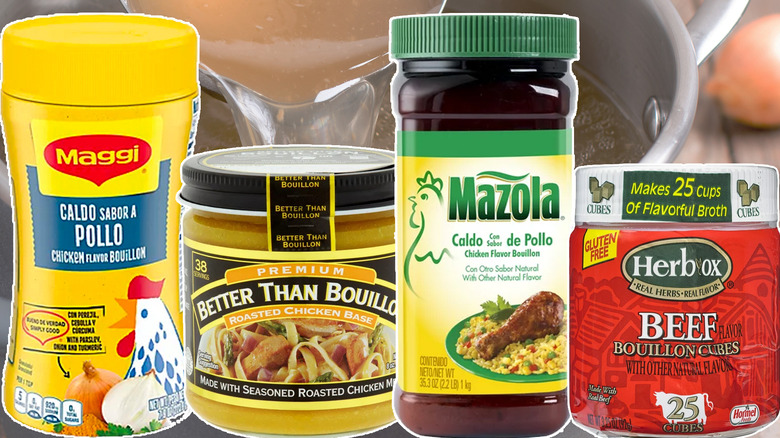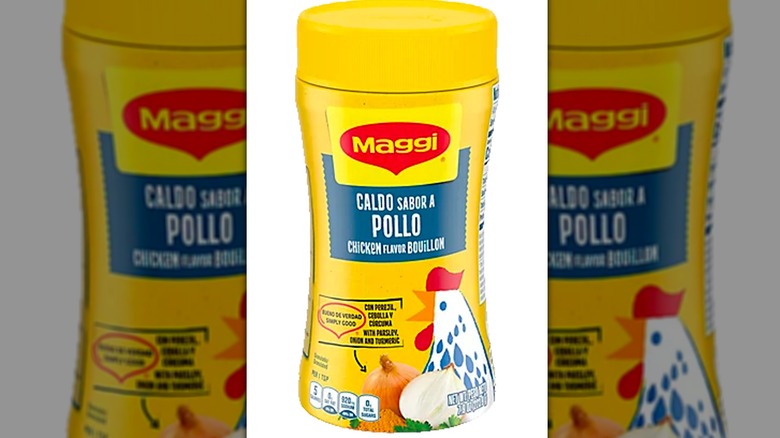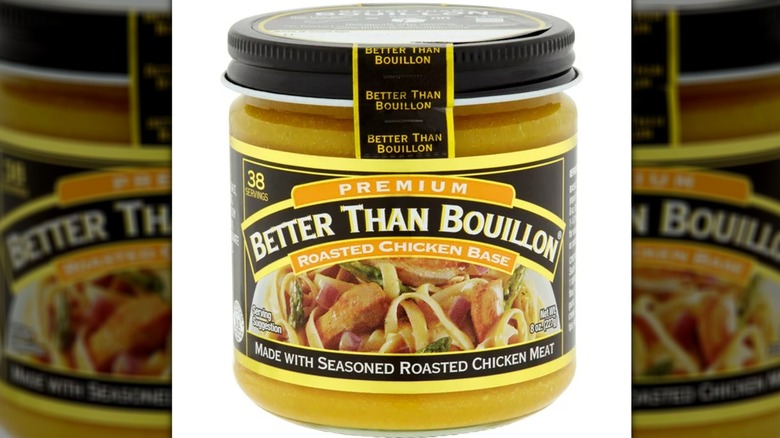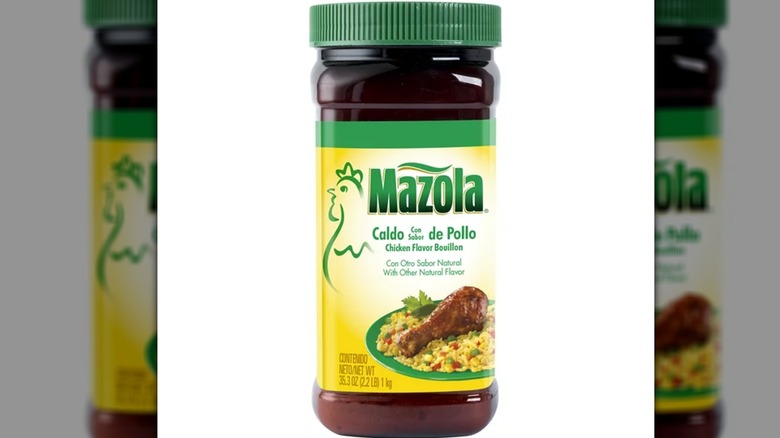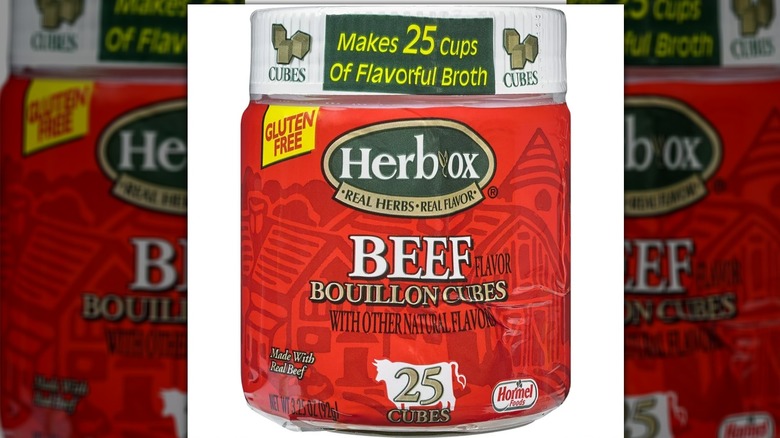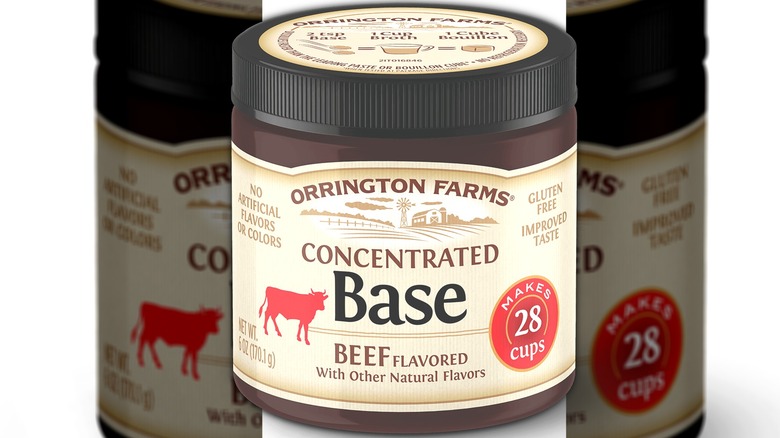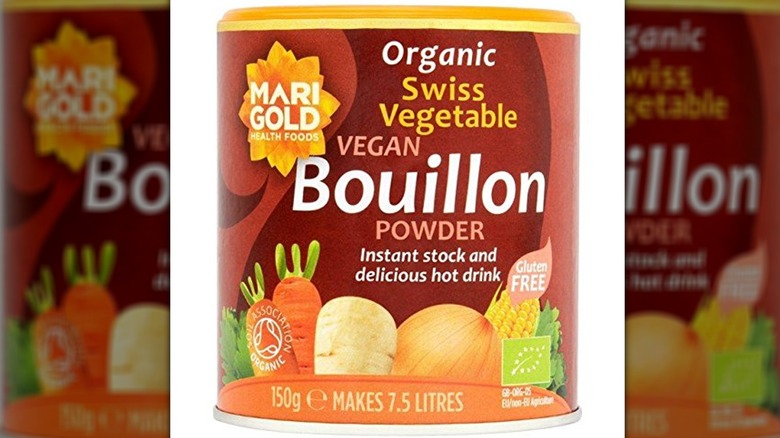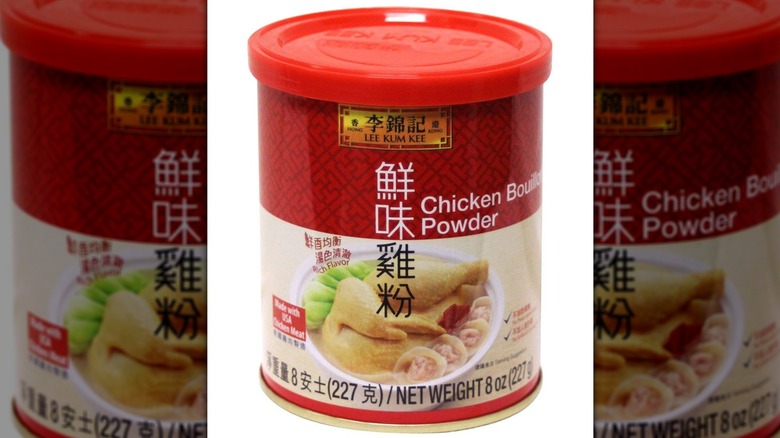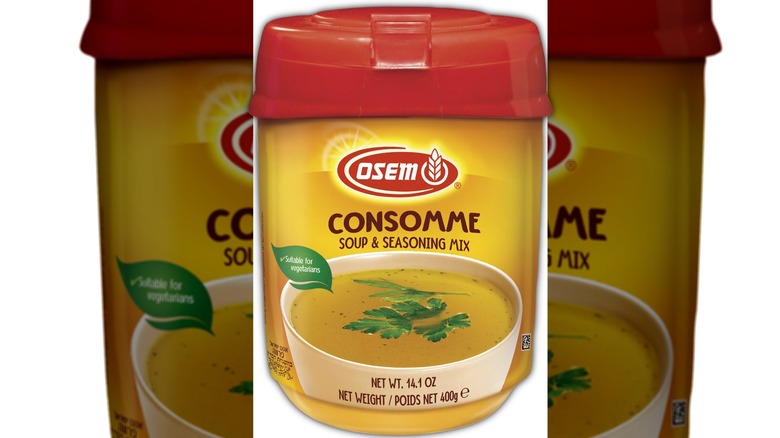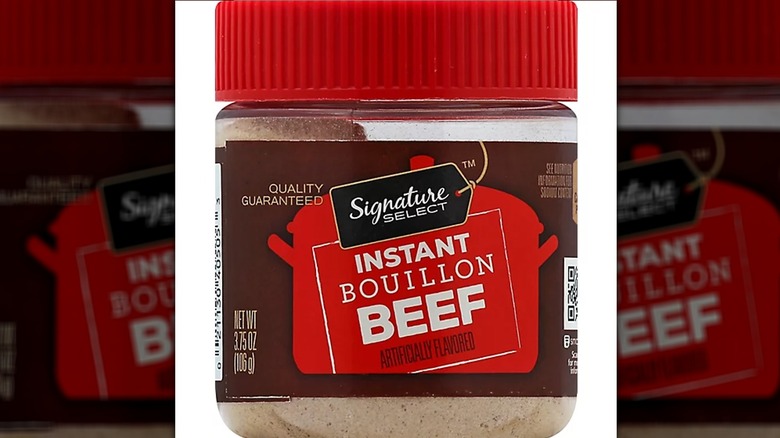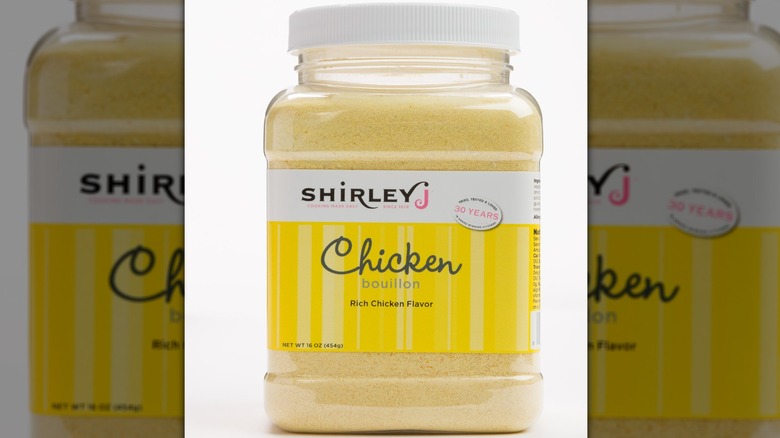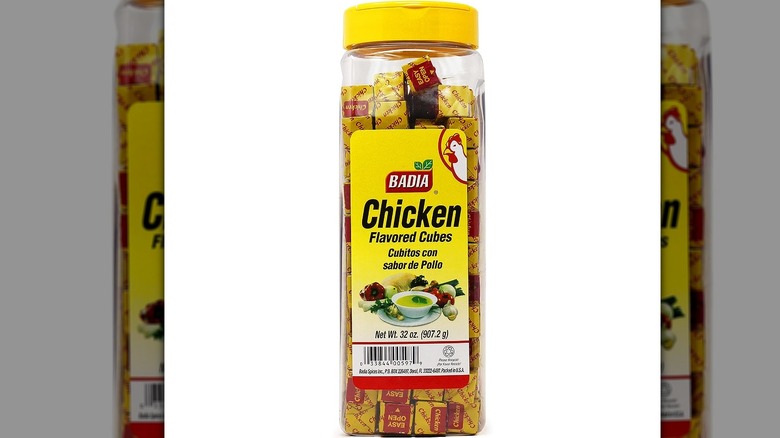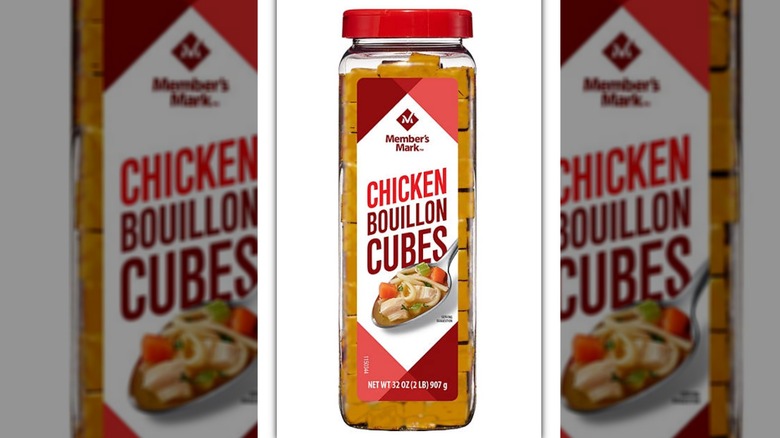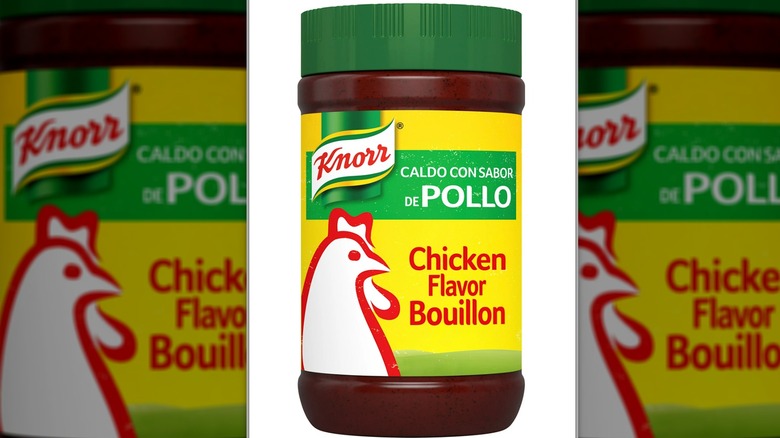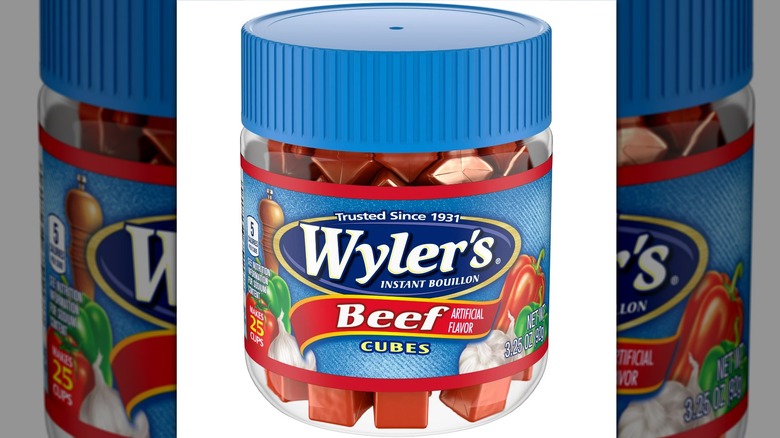The 14 Unhealthiest Store-Bought Bouillon Products
We may receive a commission on purchases made from links.
Bouillon is a popular choice among home cooks seeking quick and easy solutions for adding depth to their dishes. Besides being used to make soups, it can be employed as a seasoning to elevate the taste of sauces, gravies, rice, pasta, and a wide range of savory recipes. A closer look at some store-bought bouillon products reveals potential health hazards that consumers should be aware of. One of the primary issues lies in the excessive sodium content. With bouillon being a concentrated flavoring agent, even a small amount can contribute significantly to daily sodium intake, making it essential for individuals to monitor their consumption cautiously.
Another concern is the presence of artificial additives and flavor enhancers. Ingredients like monosodium glutamate (MSG) is commonly used to enhance the taste of processed foods, but some individuals may be sensitive to it and experience adverse reactions. Furthermore, unhealthy fats, like trans fats and palm oil, can contribute to higher levels of saturated fats in the diet.
Transparency in labeling is also an area of focus regarding bouillon products. Some brands may not provide clear information about the sourcing of ingredients or the presence of allergens, leaving consumers uncertain about what they are putting into their bodies. Additionally, the potential for hidden ingredients, such as artificial flavors or preservatives, raises questions about the overall quality and health implications of consuming bouillon regularly.
1. Maggi granulated chicken flavor bouillon
Maggi granulated chicken flavor bouillon's high sodium content is a notable concern. With 1,030 milligrams of sodium per 1 tablespoon serving, you're getting a significant portion of the recommended daily sodium intake, which is generally recommended to be limited to around 2,300 milligrams for most adults according to the FDA. Excessive sodium consumption has been linked to an increased risk of high blood pressure, heart disease, and other health issues.
While MSG is generally recognized as safe and used in a wide array of consumer products, the inclusion of it can be problematic for individuals who are sensitive or allergic to the additive. Reports of symptoms like headaches and nausea after consuming foods with MSG led the FDA to investigate its safety. Studies indicated that mild symptoms are possible in sensitive individuals; however, the amount of MSG is not usually detailed in consumer product ingredients, making it challenging to determine its exact quantity in typical food servings.
Moreover, the use of hydrogenated palm oil and other vegetable oils in the bouillon signifies the presence of unhealthy fats. Hydrogenated oils are known for their high trans fat content, which can raise levels of bad cholesterol (LDL) and lower levels of good cholesterol (HDL), increasing the risk of heart disease as detailed by Mayo Clinic. While the label indicates there is less than 2% of these oils, their cumulative impact from various food sources should not be overlooked.
2. Better Than Bouillon Roasted Chicken Base
A single teaspoon of Better Than Bouillon Roasted Chicken Base contains a significant amount of sodium, with 680 milligrams, accounting for 30% of the daily recommended intake. High sodium consumption is associated with elevated blood pressure and an increased risk of heart disease per the FDA. This product therefore may pose a challenge for individuals monitoring their sodium.
This bouillon contains 1 gram of sugar per serving. While this amount may seem small, it's important to consider the cumulative effect of added sugars in the diet, which can contribute to weight gain, metabolic issues, and an increased risk of chronic diseases, such as type 2 diabetes and cardiovascular conditions.
It also includes disodium inosinate and disodium guanylate as flavor enhancers. According to Healthline, "Although more research is needed on disodium guanylate to establish its safety limits, it's generally regarded as safe," and the guanylate – inosinate pair act as an MSG alternative. While these additives are also recognized as safe, some individuals may have sensitivities.
3. Mazola Chicken Flavor Bouillon
Mazola Chicken Flavor Bouillon's all-natural sea salt formulation that is cholesterol-free and fat-free may seem appealing to health-conscious consumers. However, a closer look at the nutrition facts and ingredients shows some contradictions. The first notable issue lies in its high sodium content, with 680 milligrams per teaspoon, constituting 30% of the recommended daily allowance. For individuals aiming to manage their sodium intake to support heart health, this product may not be suitable.
Other factors to consider are the use of artificial colors, such as Yellow 5 and Yellow 6 Lake. Although deemed safe to use by the FDA, they are a subject of debate due to potential allergic reactions in some individuals and possible hyperactivity in sensitive children, as suggested by Healthline.
MSG and disodium inosinate, both flavor enhancers, are used to amplify taste and may lead to sensitivity reactions. According to Allergy Link, the excitotoxic properties of those substances have been linked to potential neurological damage, leading to symptoms such as dizziness, anxiety, and loss of balance. Some individuals may also experience an allergic response to these additives, exhibiting skin reactions like hives and rash.
4. HERB-OX Beef Bouillon Cubes
Herb-Ox promotes its beef bouillon cubes by emphasizing the exclusion of the gluten component, added MSG, and fat from the formula. Despite its appealing attributes, each cube contains 960 milligrams of sodium, representing 42% of the recommended daily allowance. Additionally, the mix of hydrolyzed soy protein and autolyzed yeast extract in the ingredients list may raise eyebrows for some consumers, as these are sources of glutamates. Glutamates function as flavor enhancers and may not be well-tolerated by individuals sensitive to MSG-like compounds.
The ingredient lists also notes added sugar, which contributes to the cube's 2% sugar content per serving. While the amount is relatively small, those monitoring their sugar intake should be mindful of this addition. Furthermore, the inclusion of artificial caramel coloring, and the flavor enhancer duo: disodium inosinate and disodium guanylate, may not align with the preferences of those seeking minimally processed and additive-free products.
5. Orrington Farms Beef Flavored Broth Base
Orrington Farms proudly promotes its beef flavored concentrated base as free from MSG, gluten, artificial colors, and flavors, making it an appealing choice for health-conscious consumers. However, a closer look at the nutrition facts reveals that the broth base contains 970 milligrams of sodium per 2 teaspoons, amounting to 42% of the recommended daily allowance.
Examining the product's ingredient list, we encounter some red flags, particularly with the addition of maltodextrin, which possesses an even higher glycemic index than table sugar, and dextrose, a corn-derived simple sugar. Healthline indicates that these sugars may lead to sharp increases in blood sugar levels shortly after ingestion, potentially posing health risks for individuals with diabetes or other sugar-sensitive conditions.
Despite Orrington Farms' emphasis on a pure taste akin to "pure as the farm," a Walmart customer has expressed dissatisfaction with the product due to its excessive salt and sugar content. A Walmart's verified review revealed comparisons to a candy bar and descriptions likening it to a salty, watery beverage, showcasing how the product may not align with everyone's health perspectives.
6. Marigold Organic Swiss Vegetable Vegan Bouillon Powder
Marigold Organic Swiss Vegetable Vegan Bouillon Powder boasts an appealing profile, being labeled as organic, vegan, gluten-free, and free from allergenic ingredients and palm oil. With no added MSG, it aligns with the preferences of health-conscious consumers seeking natural and plant-based seasoning options.
However, a closer examination of its nutritional information raises some concerns regarding its sodium content. Five grams of the dry product contain approximately 2,410 milligrams of salt when dissolved in 250 milliliters (approximately 1 cup) of water. Comparing this to other bouillon products we've covered, it is evident that Marigold's bouillon is quite high in sodium.
This bouillon also contains maltodextrin that, while generally recognized as safe by regulatory authorities per WebMD, can cause spike in blood sugar levels. In addition, the use of vegetable oils like grapeseed and sunflower oils in the bouillon powder may raise questions about the quality and sourcing of these ingredients. While vegetable and seed oils are commonly used in food products, their high omega-6 fatty acid content and the methods of extraction have been subjects of discussion and research in the health and nutrition community as shown by Healthline.
7. Lee Kum Kee Chicken Bouillon
For consumers aiming to manage their sodium intake for cardiovascular health or those looking to limit their consumption of additives, the high sodium content and the inclusion of flavor enhancers in Lee Kum Kee Chicken Bouillon warrant careful consideration. The nutrition facts reveal that this bouillon delivers 810 milligrams of sodium per 1-teaspoon (5 grams) serving, accounting for 35% of the recommended daily allowance for sodium intake. An Amazon review further reinforces this issue, indicating that even the recommended usage rate of 5 grams per 8 ounces of boiling water results in a product with a low flavor level, prompting the user to double the usage rate to 10 grams per 8 ounces for an acceptable taste. Unfortunately, this adjustment comes at a steep cost, elevating the sodium level to a staggering 1,620 milligrams.
The ingredient list sheds light on the use of flavor enhancers, including monosodium glutamate, disodium inosinate, and disodium guanylate. Per Healthline, this trifecta is responsible for crafting an umami sensation when used together. While they are commonly used flavor enhancers in various processed foods, they can be unhealthy for individuals averse to additives.
8. Osem Chicken Style Consomme Instant Soup & Seasoning Mix
Osem Consomme Soup & Seasoning Mix highlights on its packaging as suitable for vegetarians. It also carries a kosher certification for Passover Parve under the supervision of the Rabbinate of Sderot, making it suitable for individuals following kosher dietary guidelines. While the product provides a low caloric value of 10 calories per 1 teaspoon (6 grams) serving, other nutritional aspects are concerning. The sodium content, amounting to 830 milligrams per serving, accounts for approximately 35% of the recommended daily allowance.
The ingredients list also shows the use of monosodium glutamate to enhance the flavor, which can be a dealbreaker for some, as well as palm oil, which is known to be loaded with saturated fat. Also included are corn syrup powder and sugar. This mix makes us question the overall nutritional profile of the product, as excessive consumption of added sugars and unhealthy fats are not in line with the general guidelines of a healthy lifestyle.
9. Signature Select Bouillon Instant Beef
Signature Select Bouillon Instant Beef offers a quick and easy way to add beef flavor to various dishes. However, a thorough examination of the ingredients exposes a few alerting points. The bouillon contains a considerable amount of sodium, with 830 milligrams per 1 teaspoon serving. It also includes monosodium glutamate, hydrolyzed soy protein, and disodium inosinate and disodium guanylate, which are flavor enhancers.
On top of that, the mention of sugar and corn syrup solids in the bouillon also raises alarms about the nutritional content. Additionally, the use of artificial colors such as the Red 40 does not favor consumers who wish to avoid the potential side effects of this type of unnatural dye, which may potentially exacerbate ADHD symptoms, as explained by WebMD.
The inclusion of silicon dioxide as an anti-caking agent is another notable aspect, as some individuals may prefer products without chemical additives. Additionally, Red 40 may concern parents who wish to avoid artificial colors in their children's food, especially if their kids have had adverse reactions to such additives.
10. Shirley J Chicken Flavored Bouillon Powder
Shirley J's Chicken Bouillon is advertised to deliver heightened concentration and improved yield, setting it apart from its competitors. It potentially provides a delightful taste with a smaller quantity. The brand takes pride in offering this lower sodium option, positioning it as a preferable nutritional choice.
However, a closer look at the ingredients reveals some considerations. Shirley J's bouillon contains hydrolyzed vegetable protein, derived from corn and processed with palm and/or sunflower oil. According to CBC News, hydrolyzed vegetable protein is a flavor enhancer commonly used in processed foods like soups, chili, sauces, gravies, and stews. It is known to contain up to 30% MSG. For some individuals, MSG can trigger headaches and other symptoms like a rapid heart rate, nausea, chest pain, and facial pressure or tightness.
To top it off, while this Shirley J bouillon boasts a lower sodium content compared to its counterparts, it still provides 660 milligrams of sodium per 2.5-gram serving, constituting approximately 29% of the recommended daily intake.
11. Badia Chicken Flavored Cubes
Badia Chicken Flavored Cubes, a product of Badia Spices, aims to highlight its organic and gluten-free attributes. However, this bouillon contains a high amount of sodium, with1,100 milligrams per 1-cube serving, contributing to approximately 46% of the recommended daily intake. You'll also find MSG and TBHQ (tert-butylhydroquinone), which is used as an antioxidant to extend shelf life. According to MedicineNet, TBHQ has been associated with potential health risks such as increased cancer risk, allergic reactions, and neurological effects, despite being approved as safe within certain limits by regulatory bodies.
Furthermore, Badia Chicken Flavored Cubes include various other additives and flavoring agents, such as onion powder, garlic powder, and disodium inosinate. For individuals with sensitive gastrointestinal tracts or conditions like irritable bowel syndrome and acid reflux, onion or garlic powder may cause discomfort due to their FODMAP content, as reported by Time. FODMAPs are fermentable carbohydrates that can lead to gas, bloating, and digestive symptoms in susceptible individuals.In addition, disodium inosinate, a synthetic umami flavor inducer, may concern those avoiding artificial ingredients in their food.
12. Member's Mark Chicken Bouillon
"Way too salty," says an Amazon customer review of Member's Mark Chicken Bouillon Cubes. This comment reflects a common sentiment among some consumers regarding the bouillon's high sodium content. With 1,030 milligrams of sodium per a 4-gram cube, the bouillon contributes to approximately 45% of the recommended daily intake of sodium. While the product promises to add savory chicken flavor to dishes, the excessive saltiness may overpower any other flavors, making it challenging to achieve a balanced and enjoyable taste. Also, this is not a good option for those aiming to manage their sodium intake for heart health.
The bouillon also includes MSG and disodium inosinate as flavor enhancers, and the vague description of "powdered vegetable fat" on the ingredient list lacks transparency, as it does not provide specific details about the types of fats used, their nutritional content, or their potential impact on health. Different types of vegetable fats have different nutritional profiles, and some may contain higher levels of unhealthy saturated fats, which can contribute to heart disease and other health issues if consumed in excessive amounts.
13. Knorr Powdered Chicken Bouillon
Knorr Chicken Flavor Bouillon contains 820 milligrams sodium per 1 teaspoon serving, representing approximately 36% of the recommended daily intake. Reading through the ingredients list, we discovered chemicals and synthetic components that raise concerns. It contains monosodium glutamate as a flavor boost, silicon dioxide as an anti-caking agent, and artificial coloring Yellow 5 together with Yellow 6, all of which cast doubt on its "naturally flavored" claim.
In our examination, we came across Annatto, a natural food coloring derived from the seeds of the achiote tree (Bixa orellana), which belongs to the Bixaceae family, to which some people are allergic, according to Healthline. The potential to cause allergic reactions, such as itchiness, swelling, low blood pressure, hives, and stomach pain in some individuals. Additionally, in some situations, annatto may exacerbate symptoms of irritable bowel syndrome (IBS), making it less desirable to those with sensitive digestive systems.
14. Wyler's Instant Bouillon Beef Flavored Cubes
One cube of Wyler's Beef Flavored Instant Bouillon contains 910 milligrams of sodium, representing approximately 38% of the recommended daily intake. Wyler's inclusion of artificial flavor, a synthesized compound used to mimic natural flavors in the bouillon, might be a point of consideration for those who prefer a more natural flavor source. The inclusion of headache-inducing MSG combined with disodium inosinate and disodium guanylate are also found in the cubes, as well as red 40 artificial dye.
Further down the ingredients list, we found wheat gluten, which is a protein derived from wheat that provides elasticity to dough and is commonly used in baking and processed foods. While it is safe for most people, individuals with celiac disease or gluten sensitivity should be cautious, as it can trigger adverse reactions. Per the American College of Allergy, Asthma, and Immunology, wheat allergy symptoms include skin rash, indigestion, headaches, asthma, and in some severe cases, anaphylaxis.
Another ingredient discovered in the list is soy protein. According to WebMD, certain individuals may develop gastrointestinal discomfort as a consumption side effect, allergies with symptoms like skin rashes or respiratory problems, or concerns about potential estrogen-like hormonal effects.
